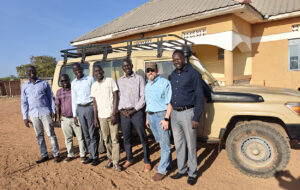Texans on Mission responds to crisis in South Sudan
Crossing the border from Uganda to South Sudan reveals the difference between poverty and extreme poverty.
When Mitch Chapman first visited South Sudan a couple of years ago, he said God “showed me poverty that I’ve not seen anywhere else.” And as director of Texans on Mission Water Impact, Chapman has spent much time in Africa.
“Even in comparison to the places we’re working in Uganda, South Sudan is so much poorer and in so much worse shape,” he said.
In April, Texans on Mission created a nonprofit in South Sudan to address the extreme water needs. The Texas-based ministry is the primary funder, and Chapman is on the board of directors.

The nonprofit’s eight-person staff is made up of people with South Sudan roots who have worked with Texans and Ugandans on Mission. The new entity, South Sudanese on Mission, is headquartered in Nyamliell. It is basically a one-year project to determine longer term viability, Chapman said.
“Our goal this year is to try to do 35 well rehabs with four or five new wells, depending on what can be negotiated,” he said. “And that would mean 40 new Bible studies and 40 hygiene classes.”
Rehabilitation of existing but nonworking wells is a priority. In Aweil West County, Chapman said there are 684 water wells and 285 are nonoperational. Texans on Mission did not drill those wells.
Before the beginning of a civil war in 2013, “organizations went and drilled a lot of wells over there, but we found out a lot of them weren’t deep enough, and they didn’t use good quality materials,” Chapman said.
Following the model established in Uganda
South Sudanese on Mission will refit those nonfunctioning wells and start Bible studies and hygiene classes in each village, following the model established in neighboring Uganda.
Chapman and local leaders spent the first week in April on staff training and administration. “But by Week 2, we’d already started to meet [for] Bible studies at four of the rehab sites.”
The Bible studies are started “independent of how many churches there are in an area,” he said. “We start a Bible study, and the people take it upon themselves to pick the church they want to go to. We don’t dictate whether it’s a Baptist church, a Methodist church or Pentecostal.
“We just teach the word [of God], and our lessons are very much about discipleship and spiritual growth. When we determine there’s not a church in the area, then we go to local church associations and encourage them to sponsor a church around the well site.”
The South Sudanese team also includes a hygiene specialist who makes sure the people “know how to wash their hands, how to clean the wellhead, how important it is not to let the goats drink from the water spigot itself,” he said. “It’s a critical component of the holistic effort.”
The work is now in an implementation phase. “We haven’t rehabbed or drilled the first well, but we’re already at work teaching the Bible, making disciples and teaching good hygiene practices.”
The biggest challenge facing the ministry is political instability, so Chapman asked Christians to pray for the South Sudanese on Mission staff and more generally for the people of the country.
“We have no involvement with either side in the political dispute,” he said. “But the political situation does impact the lives of the people and the effectiveness of our work.
“Pray that we can help meet the water needs in South Sudan, lead people to faith in Christ, and develop believers for service to God and their neighbors.”